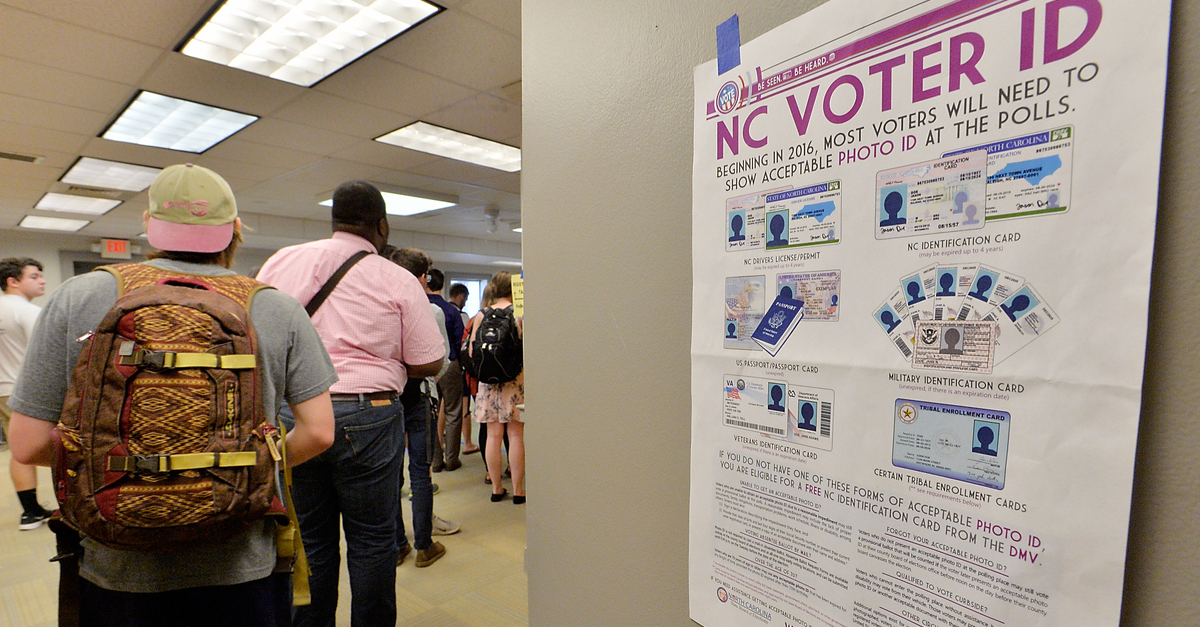
A North Carolina court struck down the state’s controversial voter ID law on Friday because it discriminates against Black people.
The three-judge panel split two-to-one over the decision but ultimately determined that Senate Bill 824 “was enacted with the unconstitutional intent to discriminate against African American voters” and “in violation of” the state’s Equal Protection Clause.
As Law&Crime previously reported, the law is currently being vetted for constitutionality in the federal court system as well. Earlier this year, N.C. Republican Party leaders were barred from intervening to defend the measure against a challenge brought by the NAACP.
In Friday’s ruling from the Wake County Superior Court, the requirement to provide photo identification before casting a ballot was unfavorably compared to Jim Crow efforts from the 1950s and 1960s that “were designed to thwart growing Black political power.”
Historical efforts to undercut Black political power in the state loomed large in the panel’s 103-page decision–with a 108-page dissent.
“Shortly after the enactment of the Voting Rights Act through the present day, African American representation in the General Assembly increased due to judicial intervention, including the decision to enforce the Voting Rights Act, and to force states to take down many of the barriers to African American voting that were erected in the 1950s and ‘60s,” the court noted.
And the culprits behind those efforts were also singled out.
“During this time, the state Republican party continued to attempt to suppress Black voter turnout,” the opinion continued. “They mailed postcards to thousands of voters in heavily Black precincts, warning recipients incorrectly that they would not be allowed to cast a ballot if they had moved within thirty days, and that if they attempted to vote, they would be subject to prosecution and imprisonment.”
But between 2000 and 2012, Black voter registration and turnout increased dramatically–delivering the state to Barack Obama in 2008 and rewarding multiple Democratic Party gubernatorial candidates.
“This most recent expansion of African American political participation has been met with facially neutral laws enacted by Republican majorities and designed to constrain African American political power,” the court said.
Key to the panel’s decision were findings from a political scientist who determined that Black voters were more than twice as likely as white voters to be negatively impacted by the voter ID law.
Those findings came out during a floor debate on a previous voter ID law attempt in the state but were not debated by the state legislature when S.B. 824 was hurriedly passed in December 2018.
“Overall, the rushed process did not allow enough time for the legislature to consider data on who might be disenfranchised by the law, to receive public input, or to debate all of the proposed amendments on the House floor,” the court determined. “In particular, the rushed process did not allow adequate time to consider concerns raised by legislators that S.B. 824 would disproportionately burden and disenfranchise African American voters.”
Those statistics, combined with the facts of poverty in N.C., mean Black voters are much more likely to “face greater hurdles to acquiring photo ID” than white voters in the state.
“The majority of this three-judge panel now concludes that the evidence presented to the Court, when viewed in the totality of circumstances, points to the conclusion that S.B. 824 was enacted in part for a discriminatory purpose and would not have been enacted in its current form but for its tendency to discriminate against African American voters,” the court concluded.
“[T]his Court permanently enjoins the law in full,” the judges noted.
Judges Michael O’Foghludha and Vince Rozier Jr. penned the majority opinion. Judge Nathaniel Poovey penned the lengthy dissent and charged that “not one scintilla of evidence was introduced during this trial that any legislator acted with racially discriminatory intent.”
[image via Sara D. Davis/Getty Images]